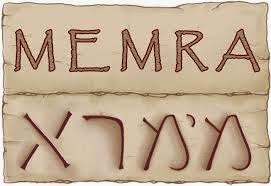By: Brian G. Chilton | December 3, 2018
One of the questions that people often pose concerning John’s Gospel is that it appears that John is greatly influenced by Hellenism—that is, Greek culture. One aspect of John’s Gospel that tends to stir this thinking is his use of the Logos in John 1. The Logos, or Word, was understood by the Greeks to be the wisdom of God(s) which was often thought to have been a physical manifestation.
I have often toyed with that idea, too. That is until I read Arnold G. Fruchtenbaum’s book Yeshua: The Life of Messiah from a Messianic Jewish Perspective. In Yeshua, Fruchtenbaum contends that John is more closely aligned with Jewish theology than Greek philosophy, especially with the Logos principle. The Christian understanding of the Word, Logos in Greek termed davar in Hebrew and memra in Aramaic, is a divine principle that is more closely aligned with rabbinical thinking than the Greco-Roman interpretation. As noted earler, memra is the Aramaic translation of the Hebrew davar which is translated as logos in Greek. Fruchtenbaum argues ancient Jewish rabbis held that the Memra was a divinely embodied person, sometimes associated with the Angel of the LORD, or the Metatron (the highest messenger of God in rabbinic angelology). As noted in the article, there are distinctions between John’s understanding of the Memra and the mystical understanding of Metatron. The Memra possessed the following six characteristics according to Targumim, a body of Jewish rabbinical commentaries on the Torah and other Scriptures.
- The Memra is the same as God but holds certain distinctions. According to Fruchtenbaum, the Memra is “sometimes distinct from God, but other times the same as God” (Fruchtenbaum, Yeshua, 211). It appears that the rabbis left the paradox intact without attempting to explain how it was that the Memra was God but was distinct from God the Father. One such example of this is found in Targum Neofiti 1 in the comment on Leviticus 19:1-2 where it is written that “the Lord spoke with Moses saying: ‘Speak to all the congregation of the children of Israel and say to them: ‘Be holy, for I am holy in my Memra. Thus says the Lord your God.” This bodes well for an understanding of Christ’s divine nature while remaining distinct from the Father.
- The Memra is involved in creation. Fruchtenbaum notes that the Memra was understood to be an “agent of creation” (Fruchtenbaum, Yeshua, 222). John notes that “all things were created through him (referencing Jesus as the Logos), and apart from him not one thing was created that has been created” (Jn. 1:3). According to Fruchtenbaum, John’s teaching is rooted in the rabbinical understanding of the Memra. The Midrash notes that “From the beginning with wisdom the Memra of the Lord created and perfected the heavens and the earth” (Midrash Rabbah: Genesis IV.3-4).
- The Memra is an agent of salvation. Throughout John’s Gospel, Jesus is shown to be the provider of salvation to those who receive (Jn. 1:12). This also bodes well with the Jewish understanding of the Memra as it was believed that the Memra not only provided physical salvation but spiritual salvation as well (Fruchtenbaum, Yeshua, 227). The Targum notes that “the people feared before the Lord and they believed in the name of the Memra of the Lord and in the prophecy of Moses, his servant” (Targum Neofiti 1: 14:30-31). Another rabbinical teaching states, “Here I am about to send an angel ahead of you to guard you on the road, and to bring you to the place that I have prepared. Beware of him and listen to his Memra, do not refuse to listen to him, for he will not forgive your sins, because his Memra is My Name” (The Targum Onqelos to Exodus 23:20-23, 69).
- The Memra is a manifestation of God. The Memra of the Lord was a way that God became visible. That is, the Memra was a manifestation of God himself. As Fruchtenbaum notes, God often manifested himself by means of light, fire, a combination of the first three, or by the Angel of the Lord (Fruchtenbaum, Yeshua, 235). This presence was often referred to as the Shechinah glory of God. The rabbis associated the Memra with the Shechinah glory such as the following Midrash, “And it was manifest before the Lord that Moses had turned to see, and the Memra of the Lord called to him from the midst of the thorn bush and said to him: ‘Moses, Moses’ . . . And Moses hid his face because he was afraid to look on the Glory of the Shekinah of the Lord” (Midrash Rabbah: XIII.2). It appears that John may have linked Jesus to the very same Memra. Some Jewish commentators linked this divine presence with the Angel of the Lord whom they called Metatron. Here, I need to warn that Metatron is sometimes associated with New Age practices and Jewish mysticism. Some Jewish mystics believe that Metatron was a created being. Even if this is the case, John reveals that Jesus as the Memra was co-eternal with God. He was not a created being, but rather the eternal God who became flesh (tabernacled) with humanity (Jn. 1:14). Nevertheless, the theology is quite interesting when considering John’s use of Logos in his Gospel.
- The Memra is the signer of covenantal agreements. In John 1:17, the Gospel notes that the law came through Moses, but that grace and truth came through Jesus Christ. The rabbinical writers of the Targum held that the Memra of God signed the covenants established by the Father. One rabbinical commentator noted that God said, “I shall remember in my Memra the covenant I made with Isaac on Mount Moriah, and I shall also remember with mercy the covenant I made with Abraham between the divided parts” (Targum Neofiti 1: 42).
- The Memra is the revealer of revelations. John connects Jesus the Logos with the Father whom Jesus had seen (Jn. 1:18). The Logos came to reveal the Father to the world. An example of this is seen in the rabbinical commentary on Exodus 4, saying, “And now go, and I, with my Memra, will be with the speech of your mouth, and I will teach you what to say” (Targum Neofiti 1: 4:12). Another passage states, “She gave thanks before the Lord whose Memra had spoken to her, and she spoke thus, ‘You are the Living and Enduring One, who sees but is not seen;’ for she said, ‘Behold, here indeed the Glory of the Shekinah of the Lord was revealed, vision after vision’” (Targum Pseudo-Jonathan: Gen. 16:13).
John’s Gospel is far more Jewish than previously imagined. Now, even the Logos principle, which has often been thought to contain strong Greek philosophical thought, is shown to have its roots in Jewish rabbinical teachings. Arnold Fruchtenbaum is to be greatly applauded for his work illustrating the Jewishness of John. If John the apostle wrote the Fourth Gospel, which this writer argues that he does, then it would make sense that John would have focused more on Jewish thinking than necessarily the Grecian alternative. While it may be that John adopted some aspects of the Greek understanding of Logos, I think after reading the rabbinical teachings on the Memra of the Lord that John’s theology was more deeply rooted in Jewish theology than Greek philosophy.
About the Author
 Brian G. Chilton is the founder of BellatorChristi.com and is the host of The Bellator Christi Podcast. He received his Master of Divinity in Theology from Liberty University (with high distinction); his Bachelor of Science in Religious Studies and Philosophy from Gardner-Webb University (with honors); and received certification in Christian Apologetics from Biola University. Brian is currently enrolled in the Ph.D. program in Theology and Apologetics at Liberty University and is a member of the Evangelical Theological Society and the Evangelical Philosophical Society. Brian has been in the ministry for over 15 years and serves as the Senior Pastor of Westfield Baptist Church in northwestern North Carolina.
Brian G. Chilton is the founder of BellatorChristi.com and is the host of The Bellator Christi Podcast. He received his Master of Divinity in Theology from Liberty University (with high distinction); his Bachelor of Science in Religious Studies and Philosophy from Gardner-Webb University (with honors); and received certification in Christian Apologetics from Biola University. Brian is currently enrolled in the Ph.D. program in Theology and Apologetics at Liberty University and is a member of the Evangelical Theological Society and the Evangelical Philosophical Society. Brian has been in the ministry for over 15 years and serves as the Senior Pastor of Westfield Baptist Church in northwestern North Carolina.
© 2018. BellatorChristi.com.






[…] writings. For more information on the Memra, I encourage you to read these two articles, “Was John’s Use of the Logos a Jewish Concept?” by Brian Chilton and “The Teachings of the Targums” by One in Messiah […]
[…] Was John’s Use of the Logos a Jewish Concept? – Brian Chilton […]
[…] Source: Was John’s Use of the Logos a Jewish Concept? […]